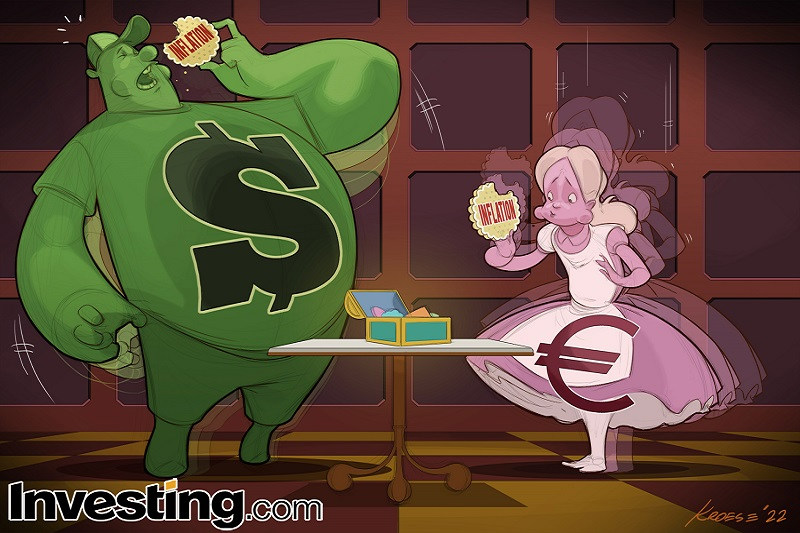
Investing.com — The alarm bells will be ringing in Frankfurt this week as the European Central Bank’s governing council meets with the euro back where it was 20 years ago – worth only a dollar.
The last time it was this weak, one could make an argument that it was still largely an unknown quantity, struggling to fill the shoes of the mighty Deutsche Mark in global foreign exchange markets. This time, it’s because its weaknesses are only too familiar.
The ECB will raise its interest rates for the first time in a decade on Thursday, having sat out the whole of the last eight years with its key rate below zero, paying banks to lend from it in a fundamental perversion of capitalism. Even after Thursday, real – that is, inflation-adjusted – interest rates will still be running at nearly -10%.
A well-timed leak on Tuesday, suggesting that the bank will discuss a hike of 50 basis points rather than just the 25 guided for, appears to have averted the embarrassment of having the euro trade below a dollar: the single currency shot as high as $1.0269 in response on a burst of what analysts said was largely short-covering.
And there was further good news for the euro later in the day, when Reuters cited unnamed sources as saying that Russia will probably restart flows of gas through the Nord Stream pipeline when a scheduled maintenance period ends this week. If confirmed, that would banish fears of an immediate and complete stop of deliveries to Europe’s largest economy, which has been one of the biggest drags on the euro in recent weeks.
However, for the euro to hold or even extend those gains, a number of things need to happen, almost all of them outside the control of the ECB.
First, there needs to be an improvement in inflation trends in the U.S. that allows the Federal Reserve to stop raising U.S. interest rates so aggressively. This is the key point in the brutally simple tale of the euro’s decline against the dollar this year: the U.S. economy is growing fast enough to withstand higher interest rates, and the Eurozone’s isn’t. While Fed officials talk of raising rates to 3.5% or more, market interest rates suggest the ECB won’t be able to go beyond 1.5%.
Second, the energy crisis currently engulfing Europe needs to abate. While Russian gas supplies remain the key pressure point here, the crisis actually goes much deeper. An acute lack of snowfall on the Alps over the winter means that rivers on all sides cannot generate the required hydropower, let alone cool France’s ageing and increasingly unreliable nuclear reactors. French electricity prices for the day-ahead hit a staggering 589 euros ($603.73) a megawatt-hour on Tuesday, a level unsustainable for any energy-intensive economy.
Energy and food accounted for around half of the 8.6% annual inflation reported by Eurostat in June. While government tax cuts in Spain, Italy and elsewhere may ease that in the course of the year, they will only do so by widening budget deficits.
Which brings us to point three of what’s needed to turn the euro around: The government crisis in Italy needs to be resolved.
This is not impossible: Italian government crises tend to happen every 12-18 months as a rule, and they all get resolved somehow. However, this one has more riding on it than most.
Financial markets want to see Mario Draghi, the ECB’s former president and a guarantor of orthodox economic policy, remain as Prime Minister. Draghi – aware that he doesn’t have a popular mandate of his own – has said he can’t continue to govern unless the populist 5 Stars Movement (M5S), which refused to give him its vote of confidence last week, returns to the coalition.
M5S defected in protest at a lack of support for lower-income groups in dealing with high inflation. Draghi has so far refused to accommodate any demands for more subsidies because he needs to present a budget that will persuade the EU to approve 200 billion euros of post-pandemic recovery funds.
There is no chance of that issue being resolved in time for Thursday’s ECB meeting, which will again stop President Christine Lagarde from giving too much away about the bank’s new ‘anti-fragmentation’ tool, supposed to keep bond yields from rising too much as the ECB finally begins to raise its interest rates. That’s because the tool will reportedly be conditional – depending specifically on the observance of Eurozone rules on spending and borrowing.
The reality is that no one is going to win the next Italian election on promises like that, whether they take place this year or next.
As such, even though the euro’s positioning looks stretched at parity, it can easily overshoot in the near term if any of the many risks around it materialize. JPMorgan (NYSE:JPM) analysts revised their target for the currency to 95c at the weekend. But for the time being, the Eurozone’s drama looks more likely to play out – yet again – in the bond markets rather than the currency ones.
Shared by Golden State Mint on GoldenStateMint.com

















